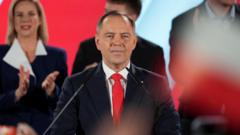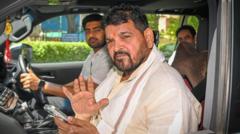**In a politically charged environment, observers note significant challenges for opposition candidates, including historical grievances and socioeconomic issues facing the nation.**
**Gabon Presidential Elections: Coup Leader Positioned for Victory Amidst Controversy**

**Gabon Presidential Elections: Coup Leader Positioned for Victory Amidst Controversy**
**As Gabon approaches its presidential election, military leader Brice Oligui Nguema appears favored despite claims of a rigged electoral landscape.**
Voters in Gabon are gearing up for a pivotal presidential election on Saturday, with a slate of candidates that includes a military commander, anti-French activists, and a female contender in this oil-rich nation of 2.5 million. However, many analysts and candidates themselves contend that the election outcome is heavily skewed in favor of Brice Oligui Nguema, the general who seized power in a coup in 2023. Nguema's rise to power marked the end of a long-standing political dynasty, and contrary to his initial promise to restore civilian rule, he has since consolidated his authority.
Political observers have highlighted the lack of a fair electoral process, emphasizing that conditions are not conducive for a true democratic vote. Joseph Siegle, director of research at the Africa Center for Strategic Studies, raised concerns about the credibility of the election stating, "It is not a level playing field to begin with." This sentiment reflects a widespread narrative that the military's influence has created an environment of intimidation and limited freedom for opposition candidates.
Gabon is uniquely positioned as one of the wealthier nations in sub-Saharan Africa due to its oil reserves, yet the populace grapples with high unemployment rates and pervasive poverty. These socioeconomic indicators are critical flashpoints in the election, as voters seek solutions to their pressing issues.
Among the candidates, Brice Oligui Nguema stands out as a dynamic figure, often shaking off his military persona to engage with voters in informal settings. He has a history intertwined with the Bongo family's legacy, having served various roles within the security apparatus under both Omar Bongo and his successor, Ali Bongo Ondimba, who was ousted in the coup.
The political landscape remains tense, with many observers wary of the implications of Nguema's potential victory on Gabon's democracy and stability. As the election approaches, both local and international attention is focused on the processes and outcomes in what is being termed a critical juncture for Gabonese governance.





















